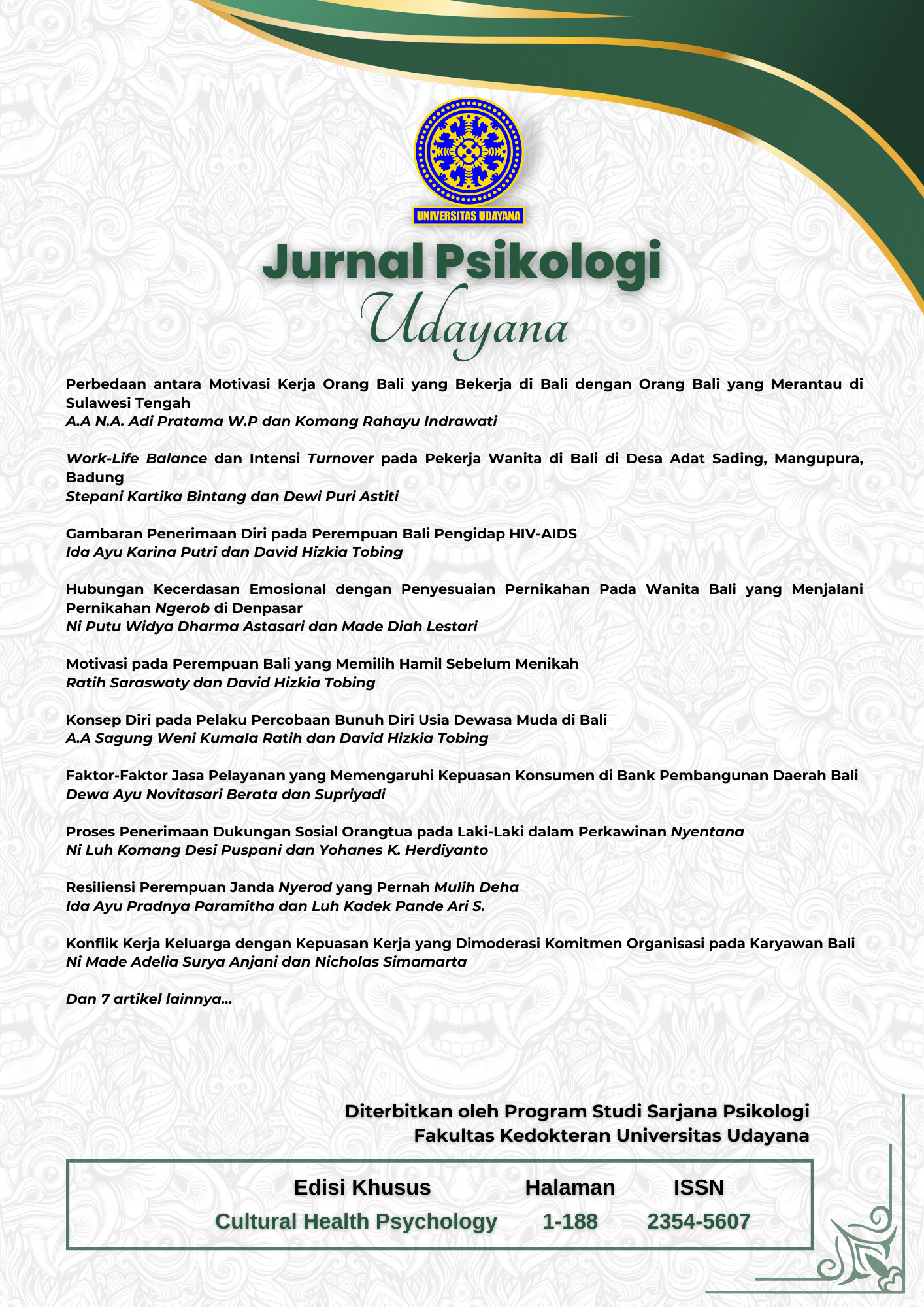GAMBARAN PENERIMAAN DIRI PADA PEREMPUAN BALI PENGIDAP HIV-AIDS
Abstract
Recent years, development of the epidemic disease of AIDS (Acquired Immune Deficiency Syndrome) has become quite frightening for the people of the world (Zarpatista, 2012). In Indonesia there are currently 75 regencies/cities which have a very high prevalence of HIV-AIDS, among others due to the increasing of transmission from husband to wife (Wardah, 2013). The province of Bali including is one of the six provinces that has status of epidemic HIV-AIDS besides Papua, Riau, Jakarta, Jawa Barat, and Jawa Timur (Suriyani, 2006). In many cases, women infected with HIV from her partner/husband because women did not have power of both socially and economically to protect herself (Nainggolan, 2004). Based on pre eliminary study that conducted by researchers in Yayasan Citra Usadha (YCUI) on the three regencies area program that is Buleleng, Jembrana, and Karangasem, discrimination recognized did occur in some cases of ODHA in Bali especially women. One of the problem in ODHA’s life is not only related to the stigma and discrimination from the around environment, but also with their self condition acceptance (Rasyida, 2008). This situation attracts researcher to find out the self acceptance in Balinese woman who lives with HIV-AIDS.
This study use qualitative method with phenomenological approach and 5 Balinese women who lives with HIV-AIDS as the respondents, the data collected with observation and in depth-interview conducted during 7 months. The result shows that there 9 representation of self-acceptance in Balinese woman who lives with HIV-AIDS which are be grateful, optimistic and always trying to do the optimum, have the right and feel equal with others, do not want to treated differently, want to help and sharing with others, self introspection, being closer with God.
Keywords: HIV-AIDS, Self-Acceptance, Balinese Woman
Downloads
References
Cronbach, L.J. (1963). Educational psychology (ed. ke-2). New York: Harcourt, Bruce, and World.
Demartoto, A. (2006). ODHA, masalah sosial dan pemecahannya. Jurnal Penduduk dan Pembangunan, 6, No. 2, 105-115.
Fournier, M., & Bensing, J. (2003) Is optimism sensitive to the stressor of chronic disease ? the impact of type I diabetes mellitus and multiple sclerosis on optimistic beliefs. Psychology and Health,18, 277-294.
Ghony, M. D., & Almanshur, F. (2012). Metodologi penelitian kualitatif. Jogjakarta: Ar-Ruzz Media.
Hasan, A.B.P. (2008). Pengantar psikologi kesehatan islami. Jakarta: Rajawali Pers.
Hasan, A., Lilik, S., & Agustin, R. (2013). Hubungan antara penerimaan diri dan dukungan emosi dengan optimisme pada penderita diabetes melitus anggota aktif PERSADIA (Persatuan Diabetes Indonesia) cabang Surakarta. Jurnal Ilmiah Psikologi Candrajiwa, 02, No. 02, 60-74.
Hjelle, L. A., & Ziegler, D. J. (1992). Personality theories: basic assumptions, research, and apllication (ed. ke-3). Singapore: McGraw-Hill, Inc.
Jawa Pos National Network. (2011). Indonesia taraf epidemi AIDS: diskriminasi ODHA perempuan lebih tinggi. Diakses: 19 Februari 2013 dari website http://www.jpnn.com/read/2012/12/01/148772/Indonesia-Taraf-Epidemi-HIV/AIDS
Hurlock, E. B. (1990). Psikologi perkembangan: suatu pendekatan sepanjang rentang kehidupan (ed. ke-5). Jakarta: Penerbit Erlangga.
Khotimah, N. (2010). Penerimaan ibu yang memiliki anak tunarungu. Jurnal Universitas Gunadarma.
Komisi Penanggulangan AIDS Nasional. (2008). Strategi penanggulangan HIV dan AIDS pada perempuan tahun 2007-2010. Jakarta
Laporan Pre-Eliminary Study mengenai stigma dan diskriminasi ODHA di Bali. (2014). Tidak Diterbitkan.
Leometa, C. H. (2007). Penerimaan diri penderita systemic lupus erythematosus (SLE) usia dewasa muda. Skripsi. Fakultas Psikologi, Universitas Indonesia.
Moleong. (2004). Metodologi penelitian kualitatif (edisi revisi). Bandung: PT.Remaja Rosdakarya.
Myers, D. G. (2012). Exploring social psychology (ed. ke-6). New York: Mc-Graw Hill International Edition.
Nurbani, F. (2009). Dukungan sosial pada ODHA. Jurnal Psikologi Universitas Guna Dharma.
Paputungan, K. (2013). Dinamika psikologis pada orang dengan HIV Dan AIDS (ODHA). EMPATHY Jurnal Fakultas Psikologi, 2, No. 1, 1-21.
Ryff, C. D. (1996) Psychological well being: encyclopedia of gerontology. Madison: Academic Press, Inc.
Sarafino, E. P., & Smith, T.W. (2010). Health psychology: biopsychosocial interactions (ed. ke-7). New York: John Wiley & Sons, Inc.
Sattler, J.M. (2002). Assesment of children behavioral and clinical applications (ed. ke-4). San Diego: Publisher, Inc.
Solikhah, K., Lilik, S., & Priyatama, A. N. (2014). Pengaruh pelatihan penerimaan diri terhadap peningkatan kebermaknaan hidup remaja tunadaksa karena kecelakaan. Jurnal Ilmiah Psikologi Candrajiwa, 03, No. 01, 53-63.
Sugiyono. (2013). Metode penelitian kuantitatif, kualitatif dan R & D. Bandung: Penerbit Alfabeta Bandung.
Sumarta, K., Sena, G. A., Anaya, G. N., & Suarmiartha. (2013). Tuntunan pendampingan dan penanganan krama dengan HIV-AIDS (KDHA) oleh desa pakraman di seluruh Bali. Denpasar: MUDP Bali Kantor Dinas Kebudayaan Provinsi Bali.
Surahma, W., & Taufik., A. I. (2012). Konsep diri dan masalah yang dialami orang terinfeksi HIV/AIDS. Jurnal Ilmiah Konseling, 1, No. 1, 1-12.
Suriyani, L. D. (2006). Makin banyak ibu rumah tangga terinfeksi HIV. In Muhajir, A., Soesanto, M & Erviani, N.K (Eds.), LENTERA: Lembaran Tentang Realita AIDS (hlm. 3-5). Bali: Sloka Institute.
Sutrisno, S. (2006). Antisipasi kaum muda Bali terhadap HIV dan AIDS. In Muhajir, A.,Soesanto, M & Erviani, N.K (Eds.), LENTERA: Lembaran Tentang Realita AIDS (hlm. 8-10). Bali: Sloka Institute.
Tobing, D. H. (2006). Punk sebagai sebuah jalan hidup/way of life (sebuah studi eksploratif fenomenologis komunitas punk di Yogyakarta). Yogyakarta: Fakultas Psikologi, Universitas Gadjah Mada-tidak dipublikasikan.
Windia, W., Komalasari, G. A., Suartika, G., Sudantra, K., Dyatmikawati, P., Pemayun., C., dkk. (2009). Perkawinan pada gelahang di Bali. Denpasar: Udayana University Press.
Authors who publish with this journal agree to the following terms:
- Authors retain copyright and grant the journal right of first publication with the work simultaneously licensed under a Creative Commons Attribution-ShareAlike 4.0 International License that allows others to share the work with an acknowledgement of the works authorship and initial publication in this journal.
- Authors are able to enter into separate, additional contractual arrangements for the non-exclusive distribution of the journals published version of the work (e.g., post it to an institutional repository or publish it in a book), with an acknowledgement of its initial publication in this journal.
- Authors are permitted and encouraged to post their work online (e.g., in institutional repositories or on their website) prior to and during the submission process, as it can lead to productive exchanges, as well as earlier and greater citation of published work (See The Effect of Open Access).













